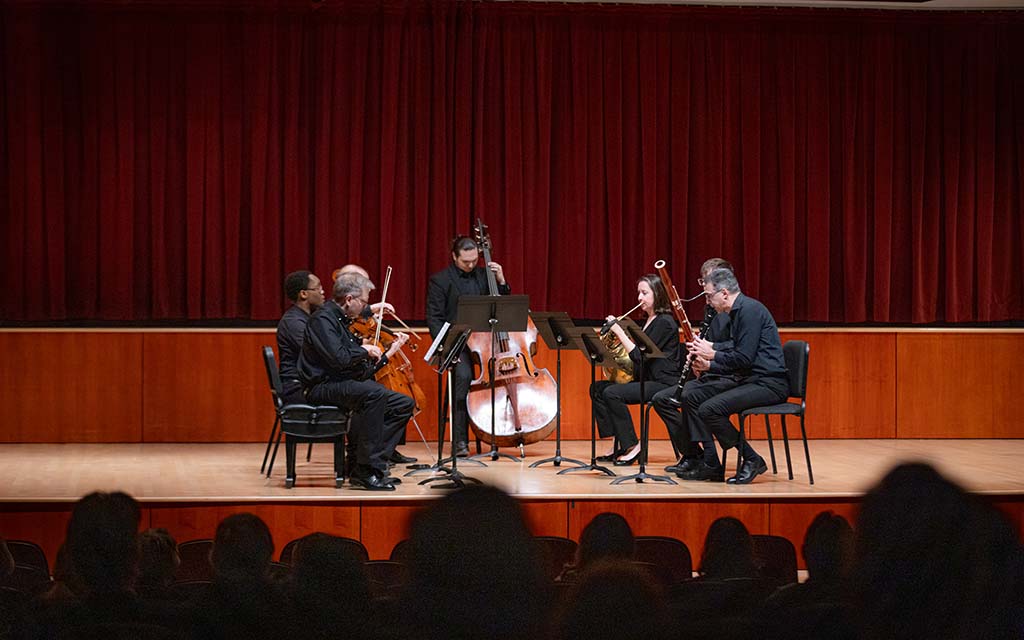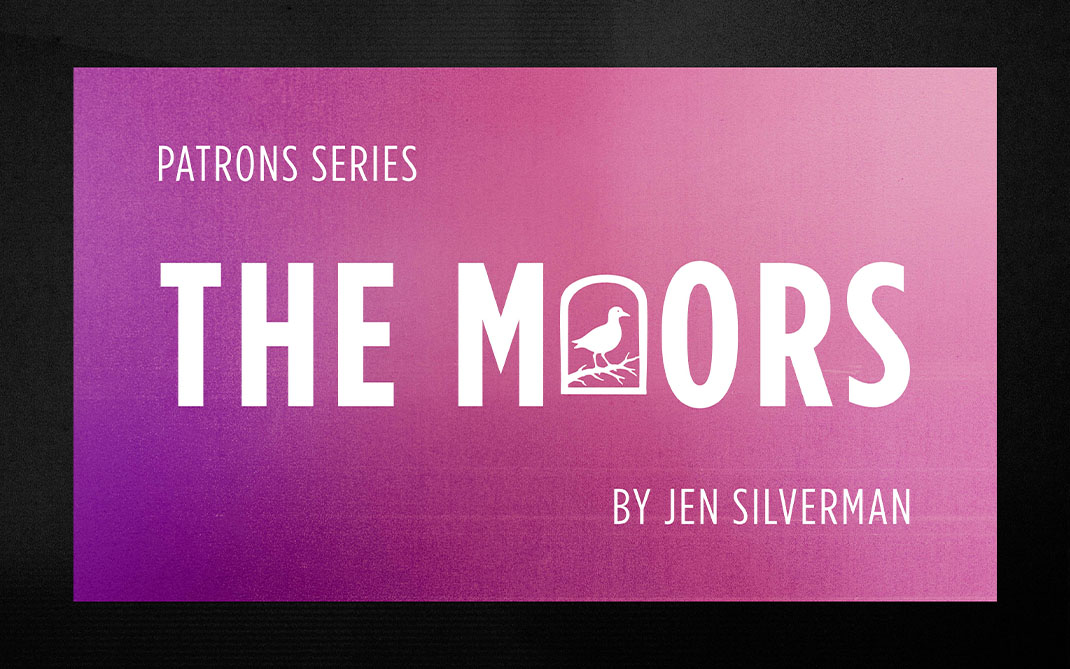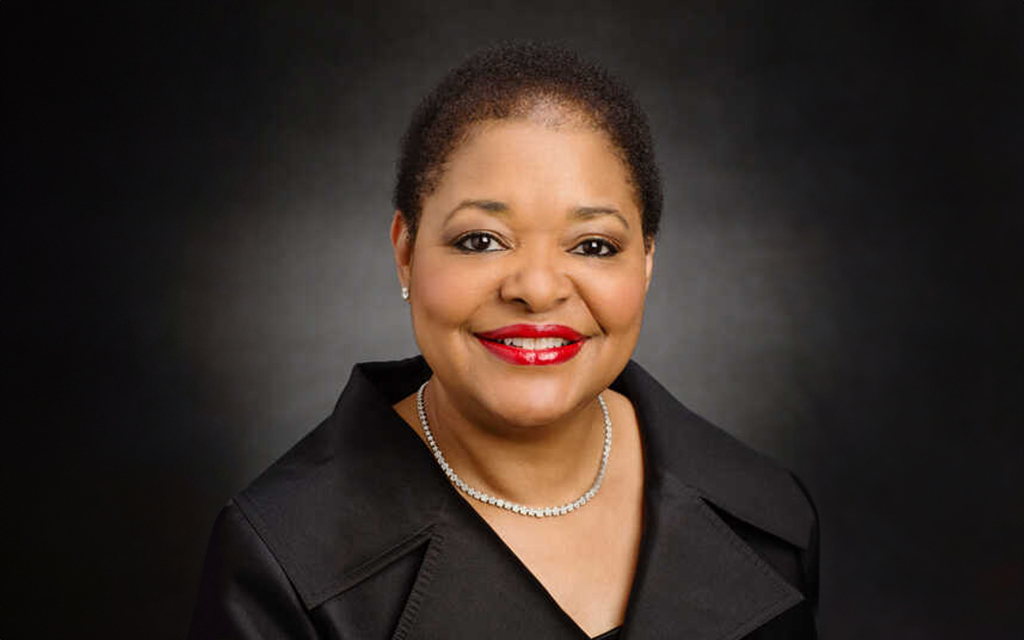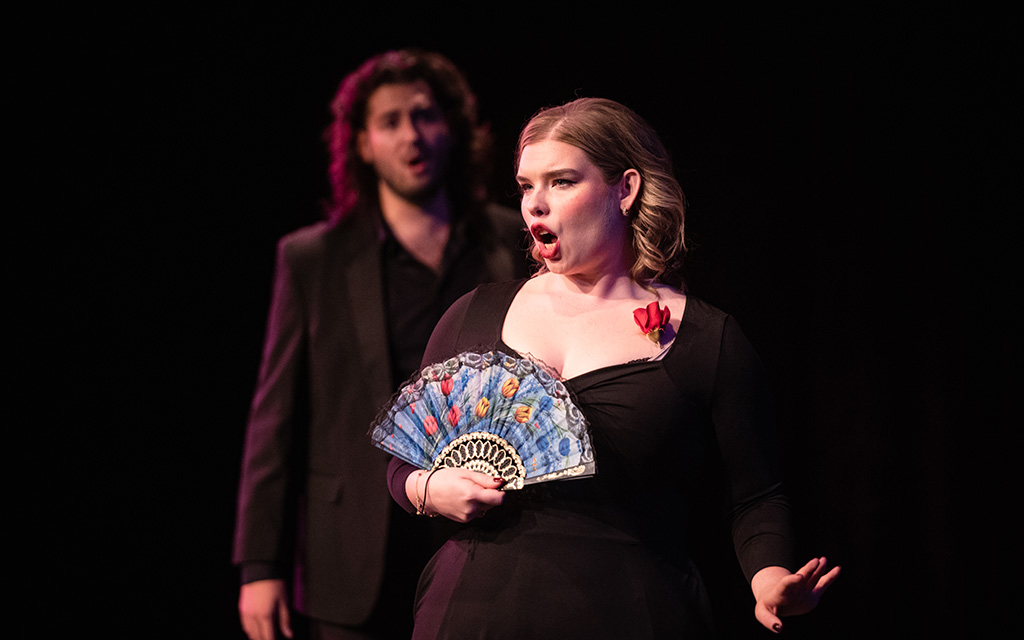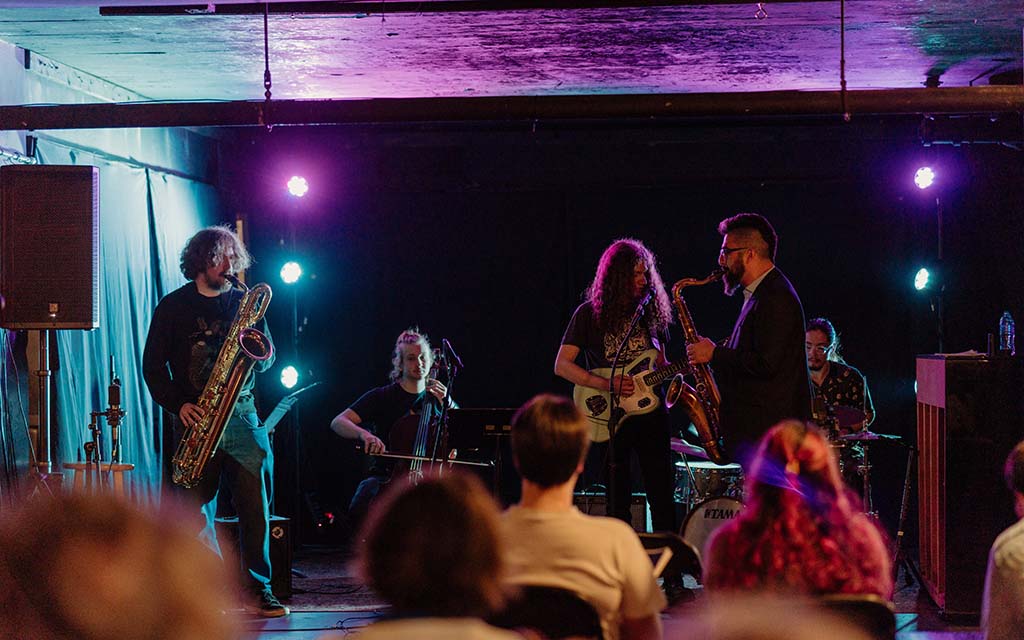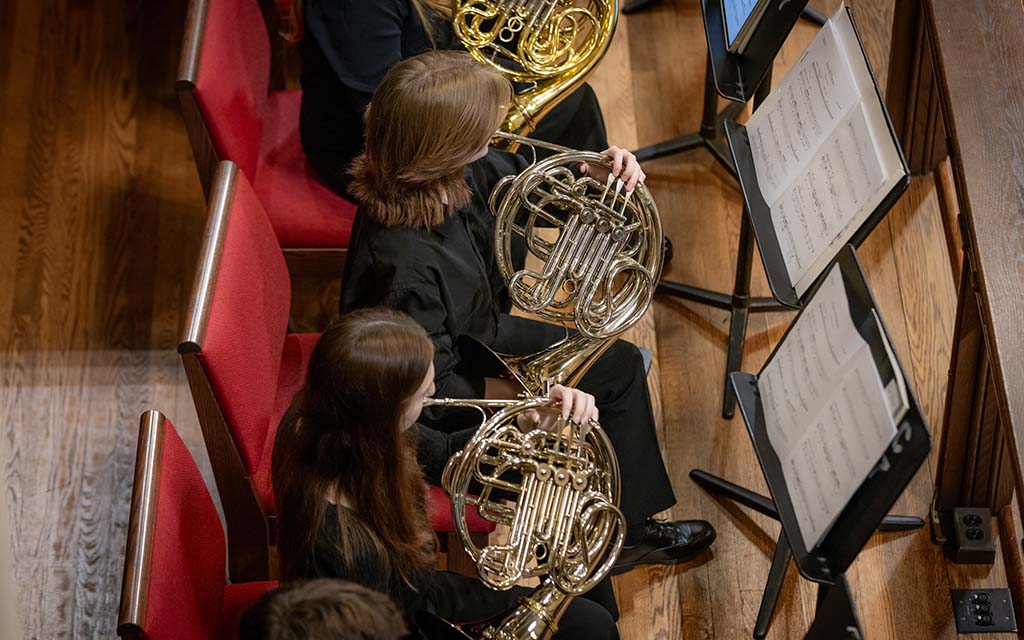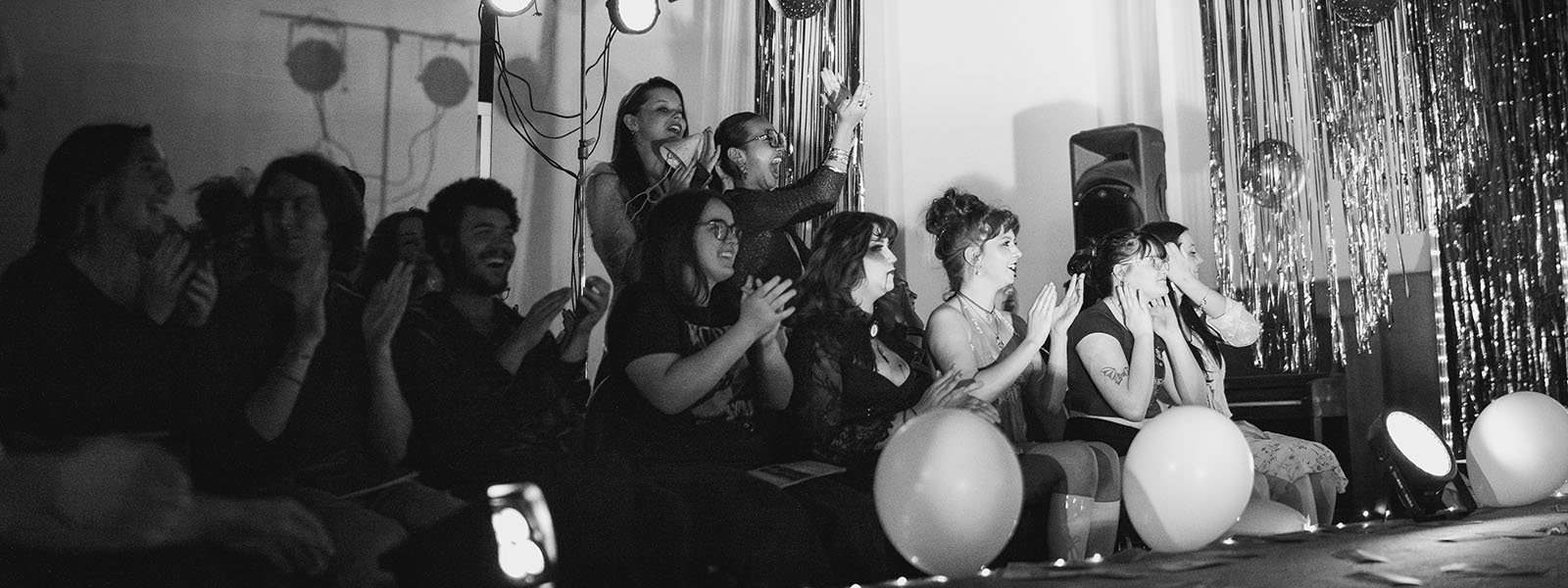How screenwriting student Cameryn Chestnut turned passion projects into campus-wide impact
Cameryn Chestnut steps onto the stage in a red dress and makeup, greeted by roaring applause at the close of UNCSA’s first drag show in over a decade. The moment is celebratory — an ode to self-expression and visibility — and deeply personal. Chestnut helped make this space possible, balancing rigorous conservatory training with intentional community building.
Later that night, after directing cleanup, he heads to The Pickle Jar still in makeup, now wearing a hoodie, eating a sandwich. The whole night mirrors the stories Chestnut writes: bold, specific, full of heart, and always centered on the kind of representation he didn’t see growing up. His motto? Everyone has a place.
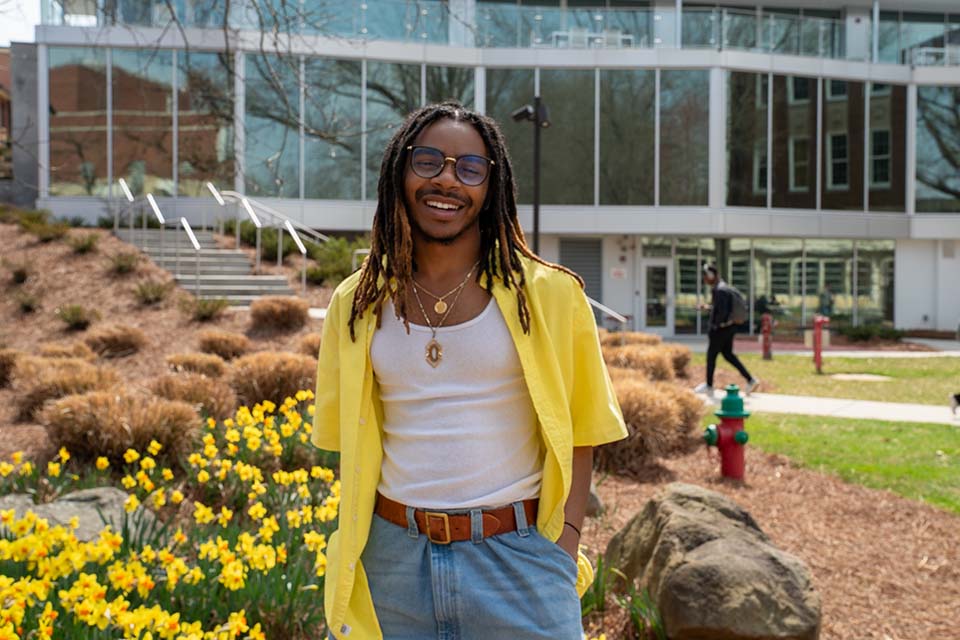
Cameryn Chestnut / Photo: Karolina Sandecka
Scene 1: Drawn to storytelling
A screenwriting major in the School of Filmmaking with a minor in arts entrepreneurship, Chestnut graduates this spring with a powerful body of work — and a legacy that extends far beyond the page. Raised in Reidsville, North Carolina, he was drawn to storytelling early: first through his imagination, then through fan fiction and television concepts sketched out in Google Docs.
“I was interested in all types of art forms,” he says, “but the one thing that was consistent was telling stories. For me, storytelling has always been a vehicle to showcase my voice, who I am and what I believe in.”
Storytelling has always been a vehicle to showcase my voice, who I am and what I believe in.
Cameryn Chestnut
That impulse eventually became a mission. “I’m huge on representation and making everyone feel included,” he explains. “The goal is to create the kind of content I would’ve loved to see — and keep doing it until others have the space to do the same. Until it becomes normal.”
Scene II: Finding a home at UNCSA
When it came time for college, Chestnut knew he wanted to focus on film and TV. UNCSA felt like a rare find. “It’s a school in the South with so much talent and so many stars,” he said. And it had exactly the kind of specialization he was looking for.
At UNCSA, Chestnut embraced storytelling across disciplines, writing for both the screen and eventually the stage. “Each one is unique,” he explains. “Stage writing is about language and emotion and how that shapes the world, while screenwriting parallels those elements in a visual way that must be equally strong.”
Rather than pick a favorite, he writes each medium with what he calls “their own formulas,” but also blends them: writing stage pieces for film-like stories, and screenplays with the intimacy of live theater. He maps characters, builds Pinterest boards, and assembles mood collages. “I’m always open to feedback,” he says. “Perfection doesn’t exist, but if you love a project, it’ll get there.”
Scene III: Casting & character
Chestnut’s love of character led naturally to casting. “Even from a young age, characters have always been my favorite part of writing,” he says. “Casting is a different way to connect with people, to see who brings the story to life in their own way.”
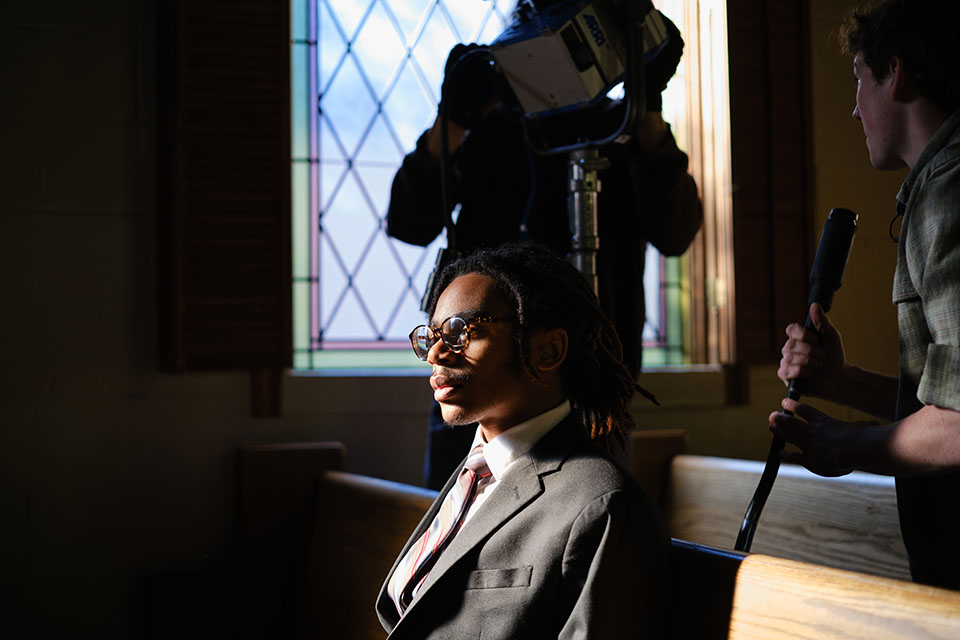
Cameryn Chestnut on set with student film On set with student film "If God is a woman, her name ain't Josie" / Photo: Wayne Reich
What began as assisting with student projects evolved into leading casting for student films, including his own. “I realized how much I enjoy it,” he says. “There’s so much undiscovered talent out there. I want to help open doors.”
Casting has even sharpened his writing. “That extra layer of examining people — their flaws, brilliance, backstories — it really helps,” he says. “I have to look at characters from a different point of view.”
Scene IV: Building worlds
Chestnut’s thesis project, “Braid Crowns,” is a modern reimagining of “Romeo and Juliet” set in 2002 Chicago, a deeply personal exploration of Black queer love. “I realized I’d never seen a story like that,” he says. “I knew I wasn’t going to unless I wrote it myself.”
Drawing from Shakespeare and inspired by the vibrant media of the early 2000s, the film blends theater and cinema. “It was a fantasy drama, but also so personal,” he says. “I had a great director who really pushed me to think about what the characters were saying and doing and how I could do better. The cast and crew were phenomenal.”
At the end of the process, Chestnut was awed by the support and love around the film. “It’s crazy,” he says. “It feels like I pitched it just yesterday.”
Scene V: Leadership in action
Chestnut’s impact extended far beyond his scripts. In his sophomore year, he founded UNCSA Pride, creating a space where queer students could gather, celebrate and lead. "I just noticed there wasn’t really a space for us,” he says. “I remember being in Tasha Myers’ office, showing her my plan. I was so nervous — suddenly, I was the president of something!”
Myers, Director of Student Engagement, became a mentor. “She helped me keep my head on straight,” he says. “She helped me find my love for leadership, and for helping people.”
That first Pride Week came together in just seven days, post-spring break: a whirlwind of drag shows, film screenings, and community events. “It was bold to start a club mid-semester while taking six classes,” he laughs. “But I got through it.” Since then, UNCSA Pride has flourished, with cross-campus collaborations and student-led programming.
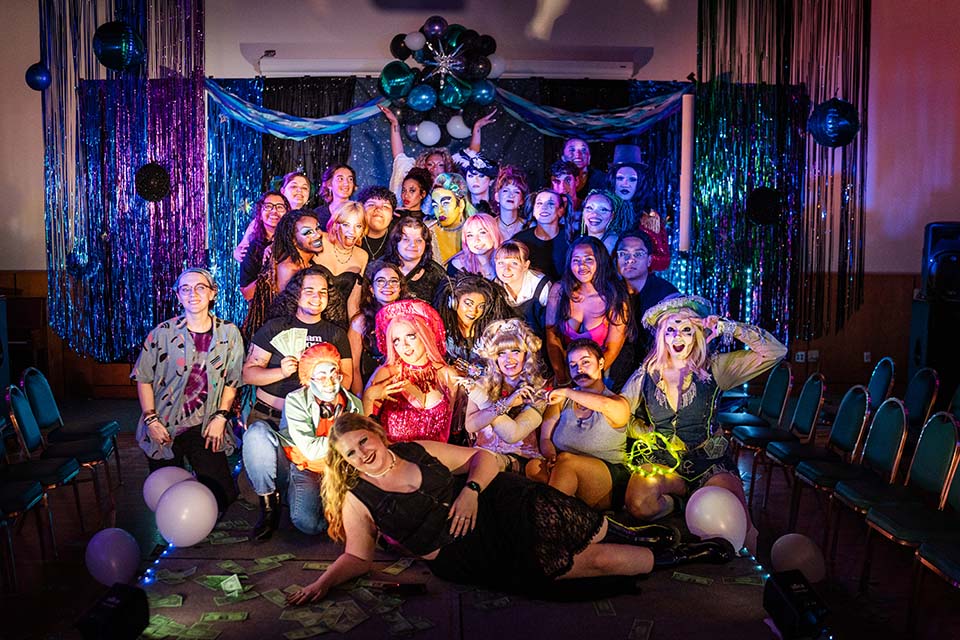
The 2025 UNCSA Pride Drag Show / Photo: Rugile Zemaityte
And Chestnut didn’t stop there. In his senior year, he launched Writers Wrave, a campus-wide table read festival designed as a welcoming, low-stakes space to showcase writing, open to all disciplines. The event gave students a chance to hear their work out loud, beyond the classroom. “I wanted to leave UNCSA knowing there was a space for writers to really show what they do from their own perspective,” he says, “to take it outside of just curriculum.”
Writers Wrave held its first event this April, starting what Chestnut hopes will become a storytelling tradition.
Final scene: Writing the next chapter
As he prepares to graduate, Chestnut has his sights set on New York. He’s applied to Playwrights Horizons, a prestigious internship for emerging writers. If accepted, he’ll spend the year developing new work. If not, he plans to save up and move to the city anyway. “I’ve already talked with alumni up there,” he says. “LinkedIn has been really helpful, a lot of alumni are happy to talk to me and just chat.”
Wherever he lands, the mission is clear: to tell stories that haven’t yet been told — ones filled with specificity, joy and freedom. Stories that reflect the world as it is and imagine it as it could be.
His advice to future artists? Don’t lose yourself to the work.
“You make the art, the art doesn’t make you,” he says. “Prioritize your mental health. Help is there if you need it. Keep your head up. The sun will shine at some point and everything will be just okay. Also, do what you want!”
Get the best news, performance and alumni stories from UNCSA.
SUBSCRIBE TO OUR NEWSLETTERS(OPENS IN NEW TAB)(OPENS IN NEW TAB)(OPENS IN NEW TAB)(OPENS IN NEW TAB)(OPENS IN NEW TAB)(OPENS IN NEW TAB)(OPENS IN NEW TAB)(OPENS IN NEW TAB)(OPENS IN NEW TAB)(OPENS IN NEW TAB)(OPENS IN NEW TAB)(OPENS IN NEW TAB)(OPENS IN NEW TAB)(OPENS IN NEW TAB)(OPENS IN NEW TAB)(OPENS IN NEW TAB)(OPENS IN NEW TAB)(OPENS IN NEW TAB)(OPENS IN NEW TAB)(OPENS IN NEW TAB)(OPENS IN NEW TAB)(OPENS IN NEW TAB)(OPENS IN NEW TAB)(opens in new tab)(opens in new tab)
May 12, 2025
